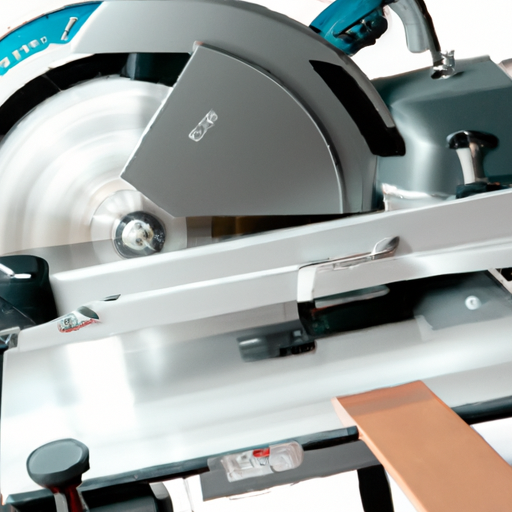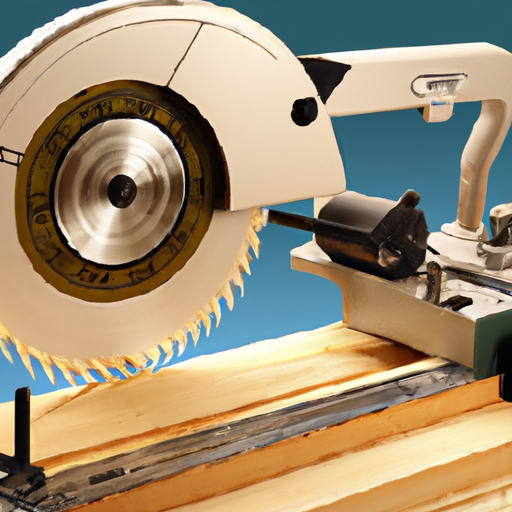Imagine having the perfect miter saw station that fits seamlessly into your workspace, allowing you to effortlessly tackle all your woodworking projects. But here’s the thing: how long should a miter saw station be? The answer to this crucial question can make all the difference in your woodworking experience. In this article, we will explore the factors to consider when determining the ideal length for your miter saw station, ensuring that it meets your needs and enhances your efficiency in the workshop. Get ready to optimize your work area with the perfect miter saw station length!

Factors to Consider
When setting up a miter saw station, there are several factors you need to consider to ensure it meets your requirements. These factors include available space, the types of woodworking projects you typically work on, mobility requirements, and working ergonomics.
Available Space
The first factor to consider is the amount of available space in your workshop or garage. Measure the area where you plan to set up your miter saw station to determine how much room you have to work with. This will help you determine the ideal length for your station.
Types of Woodworking Projects
Consider the types of woodworking projects you typically work on. If you primarily work on small projects such as picture frames or small furniture pieces, a shorter miter saw station may be sufficient. However, if you often tackle larger projects such as building decks or working with large pieces of lumber, a longer station may be necessary.
Mobility Requirements
Another important factor to consider is mobility. If you need to move your miter saw station around your workshop or transport it to different job sites, you’ll want to choose a length that allows for easy maneuverability. Consider the size and weight of your miter saw and factor that into your decision-making process.
Working Ergonomics
Don’t forget to consider your own working ergonomics when determining the length of your miter saw station. It’s important to have a comfortable and safe working environment. If you frequently experience back or neck pain while working with your miter saw, you may need to adjust the height or length of your station to ensure proper ergonomics.
Standard Length Guidelines
While the length of your miter saw station will ultimately depend on your specific needs, there are some standard length guidelines that can serve as a starting point for your decision-making process.
6 to 8 Feet
For smaller woodworking projects or limited workspace, a miter saw station with a length of 6 to 8 feet may be sufficient. This length will provide you with enough space to securely cut and support smaller pieces of wood.
10 to 12 Feet
If you work on a variety of woodworking projects and have a moderate amount of space available, a miter saw station with a length of 10 to 12 feet may be a good option. This length will accommodate a wider range of wood sizes and allow for more versatility in your work.
16 Feet and beyond
For professionals or individuals working on large-scale projects, a miter saw station with a length of 16 feet or more may be necessary. This length provides ample room for cutting long pieces of lumber and offers greater support for larger materials.
Tailoring the Length to Your Needs
While the standard length guidelines can be helpful, it’s important to tailor the length of your miter saw station to your specific needs. Here are some tips for customizing the length to suit your requirements.
Determining Required Length
To determine the required length of your miter saw station, consider the size and dimensions of the materials you typically work with. Measure the longest piece of wood you’ll be cutting and add a few extra feet to ensure you have ample support.
Adding Extensions
If you find that your miter saw station is too short for certain projects, consider adding extensions. Extensions can be removable or built-in and can provide additional length for supporting longer pieces of wood.
Modular Design
Consider a modular design for your miter saw station. This allows you to add or remove sections as needed, giving you the flexibility to adjust the length based on the specific project you’re working on.
Layout Considerations
When setting up your miter saw station, it’s important to consider how it will fit into your overall workshop layout and workflow. Here are some layout considerations to keep in mind.
Dedicated Station vs. Versatile Workshop
Decide whether you want a dedicated miter saw station or a more versatile workshop setup. A dedicated station is solely focused on the miter saw, while a versatile workshop allows for multiple tools and workstations. Factor in your available space and the types of projects you work on to make the best decision.
Integration with Other Tools
Consider how your miter saw station will integrate with other tools in your workshop. Plan the layout in a way that allows for easy access to other tools and workstations, ensuring a smooth workflow.
Storage Requirements
Factor in your storage requirements when designing your miter saw station. Consider incorporating storage solutions such as shelves or drawers to keep your workspace organized and free of clutter.

Safety Considerations
Safety should always be a top priority when working with power tools like a miter saw. Here are some safety considerations to keep in mind when setting up your miter saw station.
Clear Working Area
Ensure that you have a clear working area around your miter saw station. Remove any obstructions or clutter that may interfere with your work or pose a safety hazard.
Operator Comfort and Safety
Consider the ergonomics of your miter saw station to ensure operator comfort and safety. Make sure the height and length of the station allow for a comfortable working position and minimize the risk of accidents or injuries.
Budget and Time Constraints
When planning and building your miter saw station, it’s important to consider your budget and time constraints. Here are some factors to keep in mind.
Cost of Material
Factor in the cost of materials when determining the length and design of your miter saw station. Larger stations may require more materials, which can impact your overall budget.
Time for Construction
Consider the time it will take to construct your miter saw station. Larger or more complex designs may require more time to build. Plan accordingly to ensure you have enough time to complete the project.
Professional Recommendations
While there is no one-size-fits-all answer to how long a miter saw station should be, it can be helpful to consider professional recommendations. These recommendations are based on popular opinions, statistics, and surveys conducted within the woodworking community.
Popular Opinions
Many experienced woodworkers suggest that a miter saw station should be at least 8 to 10 feet long to accommodate most woodworking projects. This length provides ample support for cutting and working with various sizes of wood.
Statistics and Surveys
Surveys conducted among woodworking professionals indicate that the most common length for a miter saw station is between 10 and 12 feet. This range is considered versatile enough to handle a wide range of projects while still being manageable in terms of space and mobility.
Conclusion
In conclusion, the ideal length for a miter saw station will depend on factors such as available space, the types of woodworking projects you work on, mobility requirements, working ergonomics, and budget constraints. It’s important to consider these factors and tailor the length of your miter saw station to suit your specific needs. Additionally, considering professional recommendations and safety considerations will help ensure a successful and efficient setup. So, take the time to plan and build a miter saw station that meets your requirements, and enjoy the benefits of a well-designed workspace for all your woodworking projects.
